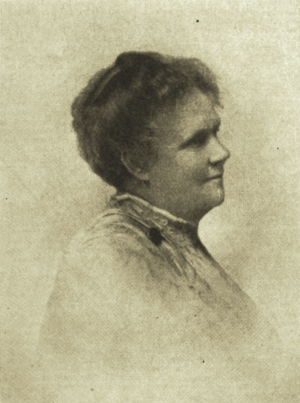Frances Estill Beauchamp facts for kids
Quick facts for kids
Frances Estill Beauchamp
|
|
|---|---|
 |
|
| Born |
Frances Estill
June 27, 1860 Madison County, Kentucky, U.S.
|
| Died | April 11, 1923 Geneva, New York, U.S.
|
| Resting place | Lexington Cemetery, Lexington, Kentucky |
| Other names | "Fannie" |
| Occupation |
|
| Political party | Prohibition Party |
| Movement | |
| Spouse(s) |
James H. Beauchamp
(m. 1875; died 1906) |
| Signature | |
Frances Estill Beauchamp (born Estill; June 27, 1860 – April 11, 1923) was an American leader who worked to make society better. She was known for her efforts in the temperance movement, which aimed to reduce or stop the use of alcohol. She was also a strong supporter of women's right to vote.
Frances Beauchamp became a leader in the Woman's Christian Temperance Union (WCTU) in 1886. She started as the local president in Lexington, Kentucky, and later became the state secretary. By 1896, she was elected the state president of the WCTU in Kentucky. She also held important national roles, serving as a national secretary and a vice president for the WCTU. She was also involved in politics, leading the Prohibition Party in Kentucky and becoming a national secretary for the party.
Early Life and Education
Frances Estill, often called "Fannie," was born on June 27, 1860, in Madison County, Kentucky. Her family had lived on the same farm for many generations. Her parents were James W. and Nancy (Scott) Estill. Her father was a large-scale farmer who raised livestock.
Frances came from a family with a long history in America. Her great-great-grandfather, James Estill, was a soldier in the Revolutionary War. He received land in Kentucky for his service. Her family also had Quaker ancestors.
Frances was an only child. She loved to imagine and dream, but her parents made sure she learned good habits and finished her tasks. She was very dedicated to her church and helped people in her community from a young age.
She went to a private school in Richmond, Kentucky, until she was nine. She was very good at math and was always at the top of her class. Later, she moved to Science Hill in Shelbyville, Kentucky, where she studied English, music, and French. She graduated when she was 16 years old.
Career and Activism
In 1875, instead of studying abroad, Frances married James H. Beauchamp. He was a lawyer who supported her goals and encouraged her work. They did not have their own children, but they welcomed and raised seven boys in their home.
Frances became interested in the temperance movement when she was young. When the WCTU started in Lexington in 1886, she quickly became a leader. She served as president of the Lexington WCTU and then held various state offices. In 1895, she became the president of the Kentucky WCTU. She also served as an Assistant Recording Secretary for the National WCTU.
Frances was a talented speaker and organizer. Her skills were recognized by leaders of the Prohibition Party, which wanted to ban alcohol. In 1909, she became the State chairman of the Prohibition Party in Kentucky. In 1911, she became a secretary for the party's national committee.
She was also very passionate about the suffrage movement, which fought for women's right to vote. She was a member of the Woman's Suffrage Association for many years.
The Kentucky WCTU also helped establish a school in Hindman, Kentucky. Frances Beauchamp was an important member of the school's board. This school was praised for its quality and helped improve education standards in Eastern Kentucky.
Frances also studied ways to improve prisons, especially for young people. She and her friends helped create the Kentucky House of Reform in Glendale, Kentucky. This place was important because it helped separate young inmates from adult prisoners, giving them a better chance to reform.
Later Life
Frances Beauchamp was a member of the Presbyterian church. She passed away on April 11, 1923, in Geneva, New York. She was buried in Lexington Cemetery in Lexington, Kentucky.
 | Toni Morrison |
 | Barack Obama |
 | Martin Luther King Jr. |
 | Ralph Bunche |

